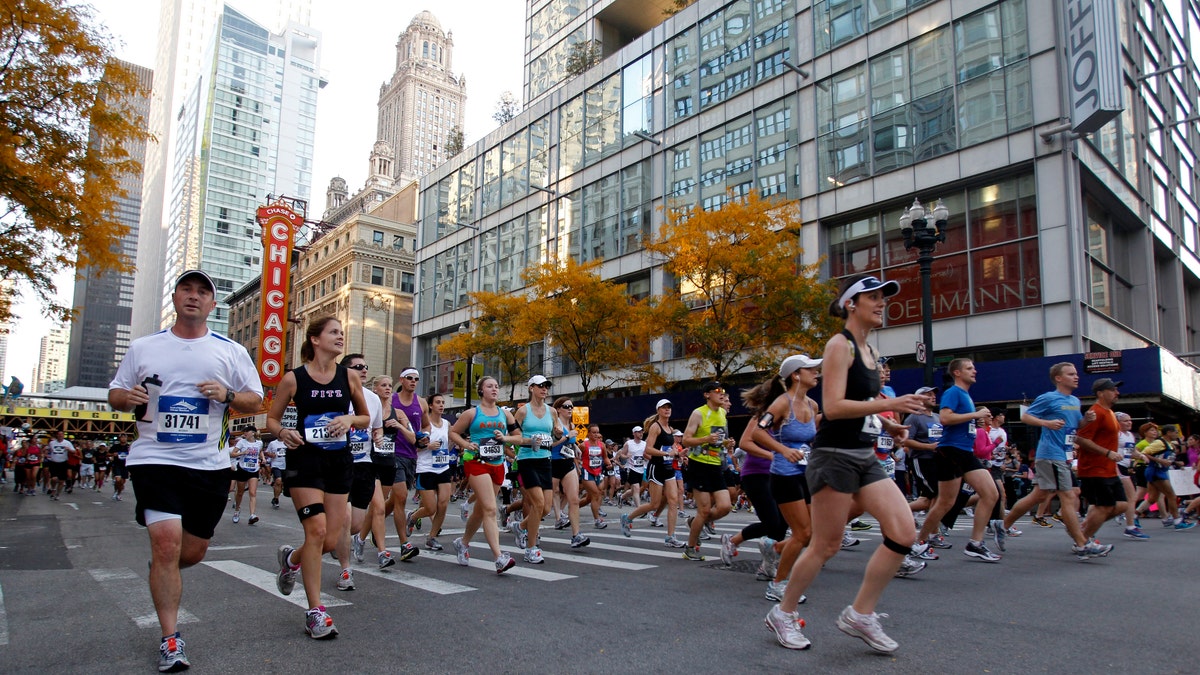
Runners participate in the Chicago Marathon October 9, 2011. (REUTERS/Kamil Krzaczynski)
As runners prepare to conquer 26.2 miles at the Chicago Marathon this Sunday, one of the most crucial elements contributing to whether or not they reach the finish line will be how they fuel themselves before and during the event.
“I’ll tell you, we’ve done a lot in the past number of years to make marathon running more pleasant,” Dr. Jordan Metzl, a sports medicine physician at the Hospital for Special Surgery in New York City, told Foxnews.com. “And a big part of that has to do with nutrition and learning the importance of fueling.”
Metzl, who will compete in his 31st marathon in New York City on November 3rd, says one of the keys to making it through a race is to start fueling properly the week before the event.
In a tradition many runners are fond of, Metzl advises participants to start ‘carbo-loading’ – increasing their carbohydrate intake by 15 to 20 percent – days before their competition. Carbohydrates are stored in the body's muscles as glycogen – a source of energy – and many believe that increasing glycogen stores pre-race can help ensure runner's have enough energy to finish their event.
Beyond filling up on pasta and bread, Metzl also said that athletes should increase their salt intake and concentrate on hydrating prior to their event, in order to prevent injuries and muscle cramps.
And fueling is just as important during the race.
“People used to not take anything, but now we have a lot of options including gel packs, Gus, and ways to ingest electrolytes and carbs together,” Metzl said. “Make sure you try different stuff beforehand, so you’re not doing it just on race day. Then, I have people take it every 45 minutes to an hour; that will help you keep your blood sugar levels up in the workable range during the race.”
Furthermore, hydrating with either a sports drink or good old fashioned water is essential. According to Metzl, when muscles get dehydrated, they can strain or tear, which could make reaching the finish line painful or close to impossible.
“You can do water for the first half, sports drink for the second,” Metzl said. “If you’re someone who loses a lot of salt when you sweat, or if it’s a hot day, you should probably be doing sports drinks the whole time.”
And how do you tell if you’re an especially salty sweater?
“The answer is when you do your long runs if you look like a human salt lick for deer, and you have salt all over your face, then you’re a salty sweater,” Metzl said. “If you have that white stuff all over you, you’re losing a lot of salt.”
Beyond 26.2 miles
If you can’t fathom racing 26.2 miles, then the feat being undertaken by endurance athletes at the IRONMAN World Championships on Saturday, October 12, will seem even more impossible. Racers from around the world are gathering in Kona, Hawaii to compete in a daunting 2.4 mile ocean swim and 112 mile bike ride, followed by a full 26.2 mile marathon.
For an event that can take longer than 12 hours to complete, proper fuel becomes even more essential. Some IRONMAN participants will be utilizing the event’s official supplement – the X2 Performance Sports Supplement.
Supplements, which are unregulated by the U.S. Food and Drug Administration, can be controversial in the sports community. But Ben Greenfield, an IRONMAN competitor and nutritionist who works with X2 Performance, said their product has gone through rigorous testing to ensure that its ingredients are safe and in compliance with anti-doping regulations.
In addition to hydrating and acting as a source of carbohydrates, the beverage claims to increase the body’s production of adenosine triphosphate (ATP) – a substance that provides energy for many metabolic processes.
“That feeling of heaviness that happens as glycogen and ATP in muscles become exhausted goes away, and you have that kick at the time when you’d normally feel a little bit heavy,” Greenfield told FoxNews.com.
Regardless of how athletes chose to fuel, experts can’t emphasize enough how important proper nutrition is to both finishing a race and making it a more pleasant experience.
“If you don’t (fuel) properly you have, what we call in running terms, ‘bonking.’…People say they end up feeling really lousy in the last 6 to 8 miles of the race…,” Metzl said. “The answer of why (fueling is) important is so you end up with a smile on your face at the end and not looking like you belong in the ‘Night of the Living Dead.’”








































